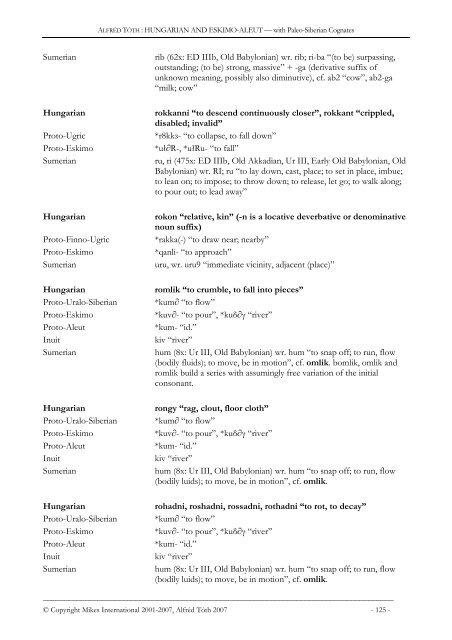Hungarian and Eskimo-Aleut
Hungarian and Eskimo-Aleut
Hungarian and Eskimo-Aleut
You also want an ePaper? Increase the reach of your titles
YUMPU automatically turns print PDFs into web optimized ePapers that Google loves.
ALFRÉD TÓTH : HUNGARIAN AND ESKIMO-ALEUT — with Paleo-Siberian Cognates<br />
Sumerian rib (62x: ED IIIb, Old Babylonian) wr. rib; ri-ba “(to be) surpassing,<br />
outst<strong>and</strong>ing; (to be) strong, massive” + -ga (derivative suffix of<br />
unknown meaning, possibly also diminutive), cf. ab2 “cow”, ab2-ga<br />
“milk; cow”<br />
<strong>Hungarian</strong> rokkanni “to descend continuously closer”, rokkant “crippled,<br />
disabled; invalid”<br />
Proto-Ugric *r8kkз- “to collapse, to fall down”<br />
Proto-<strong>Eskimo</strong> *uł∂R-, *ułRu- “to fall”<br />
Sumerian ru, ri (475x: ED IIIb, Old Akkadian, Ur III, Early Old Babylonian, Old<br />
Babylonian) wr. RI; ru “to lay down, cast, place; to set in place, imbue;<br />
to lean on; to impose; to throw down; to release, let go; to walk along;<br />
to pour out; to lead away”<br />
<strong>Hungarian</strong> rokon “relative, kin” (-n is a locative deverbative or denominative<br />
noun suffix)<br />
Proto-Finno-Ugric *rakka(-) “to draw near; nearby”<br />
Proto-<strong>Eskimo</strong> *qanli- “to approach”<br />
Sumerian uru, wr. uru9 “immediate vicinity, adjacent (place)”<br />
<strong>Hungarian</strong> romlik “to crumble, to fall into pieces”<br />
Proto-Uralo-Siberian *kum∂ “to flow”<br />
Proto-<strong>Eskimo</strong> *kuv∂- “to pour”, *kuδ∂γ “river”<br />
Proto-<strong>Aleut</strong> *kum- “id.”<br />
Inuit kiv “river”<br />
Sumerian hum (8x: Ur III, Old Babylonian) wr. hum “to snap off; to run, flow<br />
(bodily fluids); to move, be in motion”, cf. omlik. bomlik, omlik <strong>and</strong><br />
romlik build a series with assumingly free variation of the initial<br />
consonant.<br />
<strong>Hungarian</strong> rongy “rag, clout, floor cloth”<br />
Proto-Uralo-Siberian *kum∂ “to flow”<br />
Proto-<strong>Eskimo</strong> *kuv∂- “to pour”, *kuδ∂γ “river”<br />
Proto-<strong>Aleut</strong> *kum- “id.”<br />
Inuit kiv “river”<br />
Sumerian hum (8x: Ur III, Old Babylonian) wr. hum “to snap off; to run, flow<br />
(bodily luids); to move, be in motion”, cf. omlik.<br />
<strong>Hungarian</strong> rohadni, roshadni, rossadni, rothadni “to rot, to decay”<br />
Proto-Uralo-Siberian *kum∂ “to flow”<br />
Proto-<strong>Eskimo</strong> *kuv∂- “to pour”, *kuδ∂γ “river”<br />
Proto-<strong>Aleut</strong> *kum- “id.”<br />
Inuit kiv “river”<br />
Sumerian hum (8x: Ur III, Old Babylonian) wr. hum “to snap off; to run, flow<br />
(bodily luids); to move, be in motion”, cf. omlik.<br />
___________________________________________________________________________________<br />
© Copyright Mikes International 2001-2007, Alfréd Tóth 2007 - 125 -

















